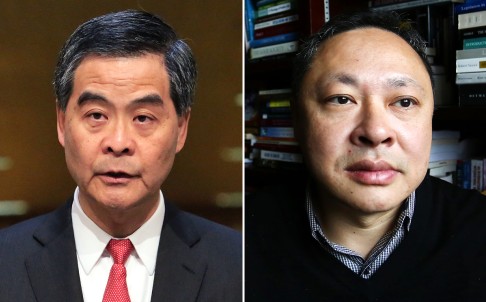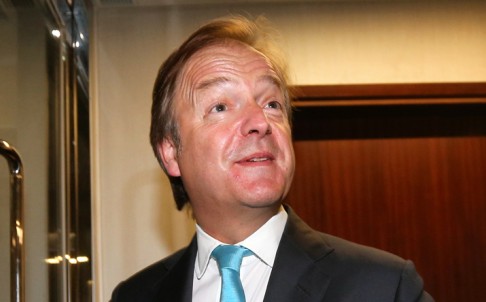
Occupy Central
Occupy Central is a civil disobedience movement which began in Hong Kong on September 28, 2014. It calls on thousands of protesters to block roads and paralyse Hong Kong's financial district if the Beijing and Hong Kong governments do not agree to implement universal suffrage for the chief executive election in 2017 and the Legislative Council elections in 2020 according to "international standards." The movement was initiated by Benny Tai Yiu-ting (戴耀廷), an associate professor of law at the University of Hong Kong, in January 2013.

Umbrella Movement
The Umbrella Movement (Chinese: 雨傘運動; pinyin: yǔsǎn yùndòng) is a loose political movement that was created spontaneously during the Hong Kong protests of 2014. Its name derives from the recognition of the umbrella as a symbol of defiance and resistance against the Hong Kong government, and the united grass-roots objection to the decision of the Standing Committee of the National People's Congress (NPCSC) of 31 August.
The movement consists of individuals numbering in the tens of thousands who participated in the protests that began on 28 September 2014, although Scholarism, the Hong Kong Federation of Students, Occupy Central with Love and Peace, groups are principally driving the demands for the rescission of the NPCSC decision.
The movement consists of individuals numbering in the tens of thousands who participated in the protests that began on 28 September 2014, although Scholarism, the Hong Kong Federation of Students, Occupy Central with Love and Peace, groups are principally driving the demands for the rescission of the NPCSC decision.
POST OCCUPY CENTRAL - DAY 29:
Full coverage of the day’s events

CY Leung repeats claim of ‘external forces’ influencing Occupy - but provides no evidence
Chief executive says he can prove foreign sway in democracy movement, but gives no evidence
Chief Executive Leung Chun-ying (left) was apparently referring to the leaked emails that showed Occupy co-founder Benny Tai (right) had forwarded HK$1.45 million in donations from at least one anonymous donor to his employer to cover some of the expenses incurred by the Occupy movement. Photos: Felix Wong, Jonathan Wong
Chief Executive Leung Chun-ying claimed yesterday there was significant information indicating that foreign powers were behind the organisation of the Occupy Central movement, but he did not provide substantial evidence to support the claim.
At the height of the pro-democracy protests in November, Leung said he had proof foreign forces had long been meddling in the city's politics and he would substantiate his claims with evidence at an appropriate time.
"The interference of external forces into Hong Kong's politics - including a large-scale and illegal public movement such as Occupy Central - should have drawn [more] attention in the society," Leung said ahead of the Executive Council meeting yesterday.
"In the past few months, large amounts of materials have been revealed … and those people concerned did not deny the validity of such documents."
Leung did not specify what those materials were, but he was apparently referring to the leaked emails that showed Occupy co-founder Benny Tai Yiu-ting, a legal scholar at the University of Hong Kong, had forwarded HK$1.45 million in donations from at least one anonymous donor to his employer over several months last year to cover some of the expenses incurred by the Occupy movement.
In an event on Monday that was open only to two pro-government newspapers - Ta Kung Pao and Wen Wei Pao - Leung reportedly said the leaked emails showed "the trace of external forces" in the Occupy movement.
Those "external forces" included foreign governments, their subsidiary organisations or foreign-based non-governmental organisations, Leung said.
In that meeting, Leung also reportedly pointed out that the donations to Tai last year were made via cashier's cheques issued by an HSBC branch in Kwun Tong - the same bank branch from which Apple Daily founder Jimmy Lai Chee-ying allegedly made donations to pan-democrats over the past few years.
But Leung has so far failed to explain how the donations were actually related to the foreign interference. A spokesman for Leung's office said no further information would be provided.
"Leung's allegations were completely groundless. Maybe it is part of his game plan to canvass public support for the political reform," Tai said. He reiterated yesterday the donations were from a local donor, but declined to reveal the donor's identity.
An internal HKU document last month showed the university's management was satisfied that Tai's donations complied with the institution's rules.
But a source close to the government said that as Benny Tai had denied receiving financial support from external sources, he should reveal the identity of the real donors.
This article appeared in the South China Morning Post print edition as Leung reiterates 'external forces' Occupy claim
Beijing's reform framework for HK 'imperfect' but 'better than nothing', says British Foreign Office
British Foreign Office chief Hugo Swire acknowledged that 'proper democracy' was not on the table for Hongkongers yet. Photo: Sam Tsang
Britain’s Foreign Office believes China’s election reform framework for Hong Kong does offer a “genuine choice” in the city’s next chief executive election.
Speaking before the British parliament’s Foreign Affairs Committee as part of an inquiry into post-handover affairs in Hong Kong, the Foreign Office’s Asia-Pacific director Stephen Lillie said it was still possible to have a fair choice of candidates in the 2017 poll.
The city’s next leader will be chosen by a 1,200-member nominating committee, under the framework set down by the Standing Committee of the National People’s Congress, China’s legislature.
The framework has been derided by Hong Kong pro-democracy activists as restrictive and limiting the race to candidates who are pre-selected by Beijing.
“Is it possible to devise detailed arrangements within the terms of the NPCSC decision that allow up to three candidates to emerge from the nominating committee who do not all look exactly the same, with the same range of policies and the same political affiliation from the pan-democrats to pro-Beijing parties?” Lillie told the committee.
“Our assessment is that it is still possible to come up with arrangements that would allow that.”
However, the Foreign Office’s chief, Hugo Swire, who was also testifying, agreed with the committee that a “proper democracy” was not on the cards for Hongkongers yet.
Nevertheless, Swire said that while the framework “may not be perfect” or “pure”, “something is better than nothing” and it did represent a genuine improvement in the status quo.
WATCH: How Hongkongers and lawmakers reacted to Beijing's dictum on leadership reform
The latest statements indicate that the British government is throwing its full weight behind the current electoral reform proposals, clarifying their stance amid tensions between London and economic partner Beijing.
Swire said he had urged members of Hong Kong’s Legislative Council to look at what options were on the table at the moment. “What we are saying is we want a package, to the benefit of all people of Hong Kong, to be endorsed because we vey much want to see this road to a purer form of democracy undertaken by 2017 and then ultimately in 2020.
“That’s the stark choice because if two-thirds don’t agree with Legco, none of this is going to happen,” he said.
Lillie also said the Foreign Office could not support a demand by Hong Kong student activists for the NPCSC to reverse its decision as that would be impractical.
The Foreign Affairs Committee, however, criticised the Foreign Office’s stance as vague, and pushed the officials to clarify what they meant when they repeatedly referred to “a genuine choice [for Hong Kong people], and a real stake in the outcome of the 2017 Chief Executive election”.
“One can’t help but feel the FCO is being intentionally ambiguous in order to avoid taking a clear stance on this,” said John Baron, a Conservative MP, earlier in the committee hearing.
Despite the tense and combative exchanges with the committee, Swire said: “I think we are on a journey to greater democracy and accountability. What we want is good government in Hong Kong, strong government … underpinned by democracy.”
Swire was also censured by the committee for failing to summon the Chinese ambassador to London after China barred British MPs last November from travelling to Hong Kong as part of the probe.
The MPs on the Foreign Affairs Committee called on Prime Minister David Cameron in December to summon envoy Liu Xiaoming over the ban. The ambassador was not available at the time the travel ban was announced on November 28.
“Formally summoning the ambassador for something he knew we would discuss with him and his colleagues ... when we first heard about this refusal would not have been an entirely productive thing to have done, frankly," Swire said.
The Foreign Office said it heard rumours in early November that the committee would be banned, but said it was not its job to inform the committee.
The office wanted to give the impression to China of a separation of powers between the executive and the legislature, it said.

`Foreign forces' claim a joke, says Tai
Leung Chun-ying has finally revealed the so-called foreign forces behind Occupy Central and pointed a finger at the movement's co-organizer Benny Tai Yiu-ting.
The Chief Executive has long insisted that foreign forces were behind the 79-day occupation and says they are still operating in Hong Kong.
Leung made the comments at the book launch of the former National People's Congress local deputy Ng Hong-mun at City Hall on Monday.
However, Tai described the allegations as a joke while pan- democratic lawmaker Lee Cheuk-yan said Leung should switch to becoming the author of fantasy novels.
In alleging Tai's involvement, Leung made reference to media leaks last year that indicated Tai acted as a middleman by accepting three payments totalling HK$1.3 million from an anonymous donor.
He then donated the money to the University of Hong Kong to fund its Public Opinion Programme, law faculty and school of humanities. Leung said all three payments were transferred from a HSBC branch in Kwun Tong, the same branch from which former Next Media chairman Jimmy Lai Chee-ying donated HK$57 million to pan-democrats.
He accused foreign countries of meddling in Hong Kong affairs through their government departments and also through foreign nongovernment organizations.
Leung said yesterday the government needs to analyze and study the organizing forces behind the movement and it has a duty to get to the root of the problem.
Leung also spoke of an article written by Tai in January 2013 in which he called for tens of thousands of people to occupy Central District to pressure the government on political reform.
However, Tai said Leung is out of touch with the "globalized world."
"What Leung said was ignorant and can be seen as a joke," he said.
Tai said as a legal scholar, it is not unusual for him to exchange views with foreign embassies, NGOs and scholars.
Tai did not address the HK$1.3 million he donated to the University of Hong Kong.


沒有留言:
張貼留言